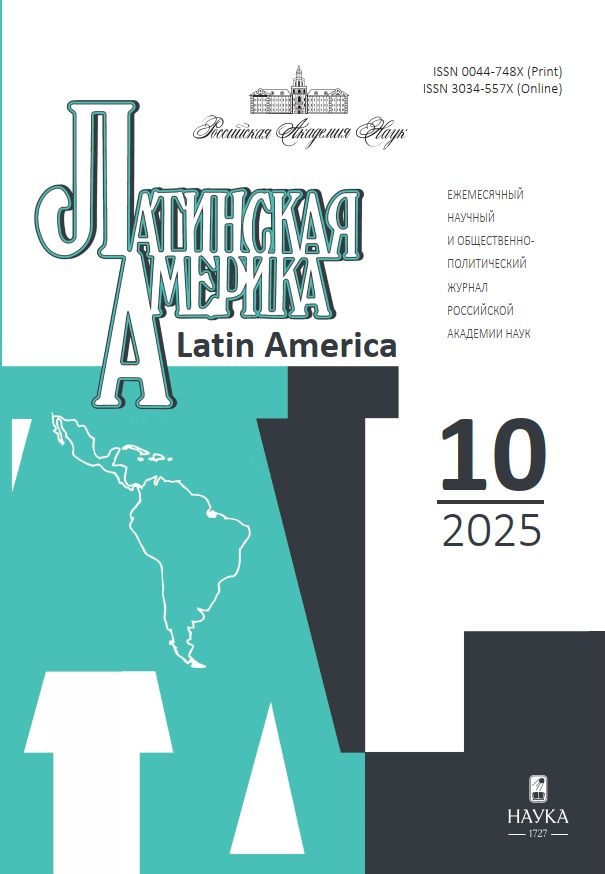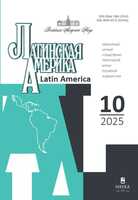Latinskaya Amerika
The peer-review scientific monthly journal comprising research papers and articles on social and political problems.
Founded in 1969.
Media registration certificate: № 0110358 от 02.03.1993
Founders
- Russian Academy of Sciences
- Institute of Latin America
Publisher
- Russian academy of sciences
Published under the authority of the Global Problems and International Relations Department of the RAS
About the journal
«Latinskaya Amerika» journal is:
- a unique for Russia and the CIS professional multidisciplinary edition in Russian, which analyses the current theoretical, scientific and practical problems of Ibero-America;
- gives readers a wide panorama of the Ibero-American world, publishes exclusive interviews of heads of state, ministers, politicians, diplomats, parliamentarians and public figures, prominent representatives of science, business, culture and art, works of world-famous writers of Latin America, Spain and Portugal;
Indexation
- the list of peer-reviewed journals recommended by the Higher Attestation Commission for the publication of works of applicants for scientific degrees;
- Russian Science Citation Index (RSCI).
Distribution
- worldwide among scientists, professors and students of higher educational institutions, as well as among the service staff, parliamentarians and business persons.
In the Journal
- Politics
- Economy
- Social problems
- History
- International relationships
- Iberian aspect
- Culture
- Art and literature
- Reviews of new editions
The authors of the Journal are leading scientists of the ILA RAS; researchers from other Russian academic and non-academic research institutes studying international affairs; industry analysts; professors of specialized universities and postgraduate students; foreign researchers.
Our readership is international affairs experts: economists, political scientists, sociologists, cultural scientists, historians; professors, postgraduate students and students of specialized universities; heads and staff of federal and regional government bodies.
Current Issue
No 10 (2025)
Economy
Enterprises in the format of “maquiladoras” in Latin America. A forced necessity or a panacea?
Abstract
The Latin American region is confidently strengthening its position as one of the key players in the emerging multipolar world order. In the 20th century, after World War II, Latin America became the most peaceful macro-region: the number of victims of interstate armed conflicts here was an order of magnitude lower than in other parts of the world. Latin America has colossal natural resources. This region is of interest also because it is the states of the Southern Hemisphere that demonstrate the most impressive rates of economic development. The foreign policy significance of the region is noticeably increasing, its independence in resolving international issues is increasing. Many countries are seeking to find business partners, resources and allies in Latin America, expressing interest in mutually beneficial development and cooperation. The investment attractiveness of the region is very diverse and is realized in various formats and programs of international cooperation. One of the examples of successful implementation of joint investment programs between leading countries (primarily the USA) and relatively underdeveloped (at the time of concluding the agreements) are special economic zones (SEZ) in the format of maquiladoras, the activities of which gave a qualitative impetus to the development of the countries of the Latin American region.
In the course of writing this work, a number of methods were used: synthesis of scientific data, comparative, theoretical (content analysis) and empirical studies (work with official press releases of international organizations and regulatory legal acts of individual countries).
The purpose of the article is to identify the features of the functioning of maquiladoras in some Latin American countries, where their activities are the basis of production and investment cooperation with foreign partners.
The scientific novelty of this study lies in an attempt to systematize and reveal the areas of activity of maquiladoras not only in Mexico, as the country-founder of this SEZ format, but also in other Latin American countries that are close in terms of the level of economic development and economic structure. The sources of information available to us showed that the research of scientists is mainly related to the study of the phenomenon of "maquiladoras", especially in the context of changes in international trade and economic policy. However, most of the works focus on specific aspects of the functioning of such enterprises and their impact on the economy mainly only of Mexico. Thus, although Russian and foreign authors certainly contribute to the study of the topic of "maquiladoras", their works are limited to individual aspects and require further in-depth analysis for a comprehensive understanding of the phenomenon for the entire Latin American region.
 6-24
6-24


Policy
Political and economic rivalry between the US and China in Central America amid rising global tensions
Abstract
The article examines the relations of the Central American states with the USA and China at the present stage in the context of the rivalry of power centers within the region. By statistical descriptive analysis and the study of the domestic political context, the authors have identified a trend towards the aggravation of political and economic contradictions in the struggle for influence over Central American countries. The greatest potential for conflict is expected in Guatemala, Honduras and Panama. While maintaining the current balance of power Washington will remain dominant in Costa Rica, El Salvador and Nicaragua. Taking into account the authors' hypothesis that the dynamics and proportions of arms supplies from the great powers reflect the balance of power in foreign policy control, the US political influence in the region stays strong. At the same time China using a strategy of economic cooperation is contributing to the erosion of competitor’s dominance, which can be reinforced by military supplies from alternative arms exporters.
 25-42
25-42


Colombia: political actors and national security during the left shift
Abstract
Gustavo Petro is the first president of Colombia who represents the left spectrum. His electoral campaign was based on an ambitious program of post-conflict settlement under the general name of total peace (paz total). The article attempts to identify the ideological foundations of the corresponding policy, the views of military leaders and civil society to find out the differences and similarities in the interpretation of national security. The hypothesis consists in finding the differences in the interests of the main political actors that determine the misunderstanding and misinterpretation of total peace.
 43-56
43-56


International ties
Territorial dispute between Guatemala and Belize
Abstract
The article presents the most comprehensive and up-to-date analysis of the history, status and prospects for resolving the territorial dispute between the Republic of Guatemala and Belize. Particular attention is paid to the root causes of the dispute, the sequence of its development, the positions of the parties and the reasons for its referral to the International Court. There is also an emphasis on the influence of the great powers on this problem.
 57-72
57-72


Point of view
Once again about “conceptual positioning” and not only about it. Theoretical problems of Latin American studies. About Vladimir Davydov’s concept
Abstract
The article is an analysis of V.M. Davydov’s book “Conceptual positioning in line with the regional studies. The experience of Latin American studies and not only...” (Moscow: Ves Mir Publishing House, 2023) both from the point of view of its genre originality and from the point of view of its scientific content. The author substantiates the idea that the work of the current scientific director of the ILA RAS organically fits into the framework of the intellectual tradition common to both Russia and Latin America, the distinctive feature of which is the syncretism of creative strategies: a combination within the same text of the features of scientific-analytical and imaginative-emotional ways of studying human reality. This combination is typical of the syncretic type of creative personality (also characteristic of both Russian and Latin American civilizations), combining the features of a "scientist" and an "artist" (in the broadest sense). It is emphasized that V.M.Davydov is primarily a scientist, and the main thing that determines the significance of his work is his scientific analysis of the formation and development of the regional studies scientific school of Latin American studies in the context of comparison with other regional studies schools represented in Russian science.
Davydov’s work is analyzed in the universal context of changing general scientific paradigms in Russian and world science, and the cognitive basis of V.M.Davydov’s approach is revealed, based on a type of rationality rooted in the Russian spiritual tradition, namely, value rationality, which is in extremely contradictory interaction with capitalist formal rationality of Western origin.
According to the author of the article, V.M.Davydov’s book is also a vivid illustration of M.M.Bakhtin’s idea that the main distinguishing feature of humanitarian knowledge is its dialogical character.
 73-84
73-84


History pages
THE “STRANGE RUSSIAN” ON “REBELLIOUS LANDS”. LATIN AMERICA IN THE WORKS OF VASILY CHICHKOV (PART 1)
Abstract
The article examines the development of the Soviet Union's interaction with Latin America after World War II, focusing on the figure of Vasily Mikhailovich Chichkov, a special correspondent for the Pravda, a publicist and playwright. Chichkov became a key participant in the formation of the image of Latin America in the Soviet cultural space. An important element of this was the theme of the suffering of Latin American peoples from the “imperialist” oppression of the United States and the desire of “progressive” forces to liberate themselves from it. The first part of the article shows the shaping of the “infrastructure” of the Soviet information policy and “soft power” in Latin America, including the interaction of the highest party and state bodies with embassies and institutes of cultural relations, as well as publishing activities. The research is undertaken into Chichkov's understanding of history and socio-political processes in the region, formed during his travels to Mexico, Honduras, Panama, Venezuela, Peru, Chile, Bolivia, Argentina, Brazil, Uruguay, and his creation of a positive image of the Soviet Union in Latin America. The significant influence of the Cold War events and especially the US intervention in Guatemala in 1954 on his worldview is noted. The traveler and journalist analyzed the possibilities of expanding economic, political and scientific cooperation between the USSR and Latin American countries, pointing out the inevitability of reliance on nationalist circles of the middle class interested in weakening the control of foreign monopolies over natural resources and trade. Chichkov's reports contained detailed, although not always profound, recommendations on building relations with the Communist and “reformist” parties and trade unions. The that Moscow later took in Latin American relations matched those recommendations in many ways.
 85-98
85-98


The political concepts of utopian socialism in Yucatan (based on Salvador Alvarado's story "My Dream")
Abstract
This article is dedicated to a analysis of a relatively understudied work by Salvador Alvarado, governor of the Mexican state of Yucatán, entitled "My Dream" ("Mi Sueño"). The work constitutes a literary expression within the utopian genre. Notwithstanding its literary form, the narrative functions as a political manifesto outlining revolutionary reform initiatives aimed at transforming the region's economic and socio-cultural structures. Several elements of Alvarado's proposed program are rooted in the ideological frameworks of French and Anglo-American socialism, notably drawing on the ideas of Saint-Simon and Henry George. This study will critically examine the core components of the Yucatán modernization project and explore the conceptual role of utopia as a heuristic device for interpreting and enacting social transformation during the revolutionary period in Mexico in the early 20th century.
 99-110
99-110













